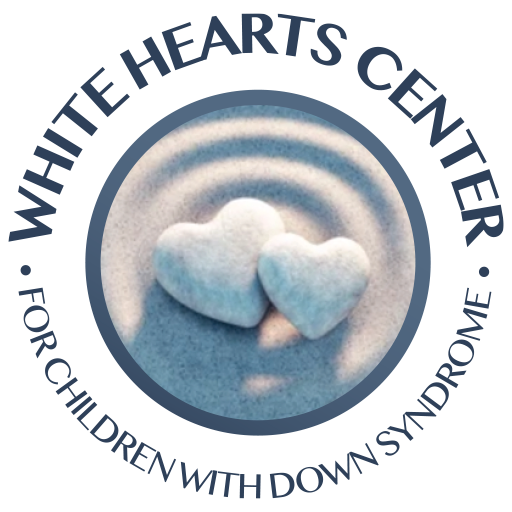Psychosocial Support
White Hearts Center provides psychosocial support for children with Down syndrome, aiming to enhance their behavior and empower them to interact with their families and community. A qualified specialist implements a set of activities which may include:
- Group and individual psychosocial support sessions.
- Recreational sessions and activities.
- Awareness sessions for children.
- Awareness sessions for care providers and families.
- Behavior modification sessions for children.
- Celebrations of international events.
- Follow up with care providers for children’s cases.
- Providing advice to children’s families about accomplishments, as well as challenges, related to their therapy and care.
Education and Learning
White Hearts Center currently operates four classrooms, divided into four categories, according to the chronological and mental age of the children. WHC’s educational programs include independence skills, daily life skills, and self-care skills, as follows:
- Motor skills, including simple and complex skills.
- Language skills, including receptive and expressive language.
- Academic skills, including reading, writing, and arithmetic.
- Basics of English language.
- Social skills.
- Religious skills.
- Economic skills.
- Professional and recreational preparation skills, in a simplified definition for each profession.
Speech and Pronunciation Services
Children with Down syndrome normally suffer from speech difficulties and lack of correct speaking skills. Our specialists deal with children individually to assess their abilities and diagnose their needs. Assessment includes general and personal information, family status, and economic status. It is important to diagnose and evaluate individual cases and identify weak points for each case so that those needs can be effectively addressed. WHC works to identify the strengths of each child to enhance their self-confidence and help the specialist during every session. After the assessment, a treatment plan is developed for each case, with clear short- and long-term goals. These goals include developing sensory, cognitive, and mental skills and developing the child’s receptive language until they can advance their language capabilities. The plan includes exercises on the speech organs, such as developing the tongue and jaw muscles and sucking and swallowing exercises. The plan also includes the most significant point of correcting the pronunciation of letters individually, and then integrating them with the context of the word within subject plans according to the approved Apraxia curriculum, which relies on pronouncing letters in more than one syllable and in more than one position.
Physical Therapy Services
Providing physical therapy services for children with Down syndrome is a vital part of the comprehensive care program for these children, who face physical challenges that may affect their quality of life and independence. Down syndrome is characterized by a range of physical and cognitive characteristics that require a specialized approach to physical therapy.
Objectives of physical therapy for children with Down syndrome
- Improve motor-physical skills: Children can improve their basic motor abilities such as sitting, crawling, standing, and walking. This is achieved through regular exercises that help strengthen muscles, increase flexibility, and improve their balance.
- Enhance performance and abilities: Physical therapy services help children develop skills needed for daily activities such as dressing, eating, and personal hygiene. This training aims to enable children to achieve maximum independence in their daily lives.
- Improve balance and control: Many children with Down syndrome have problems with balance and control. Physical therapy helps develop these skills through exercises that focus on improving motor control and enhancing balance.
- Strengthen muscles and increase flexibility: Muscle weakness and decreased flexibility are common features in children with Down syndrome. Physical therapy helps strengthen muscles and increase their flexibility through customized training programs based on effective motor exercises.
Physical therapy techniques used
- Motion exercises: These exercises include activities designed to stimulate motor development and improve balance and coordination. Exercises can include balancing on a therapy ball, climbing, and crawling, as well as other exercises that can help develop strength, endurance, and flexibility.
- Interactive activities: Interactive activities include games and activities that encourage children to move and interact in ways that improve their motor and social skills. These activities can include playing with peers or participating in group activities that promote cooperation and teamwork.

